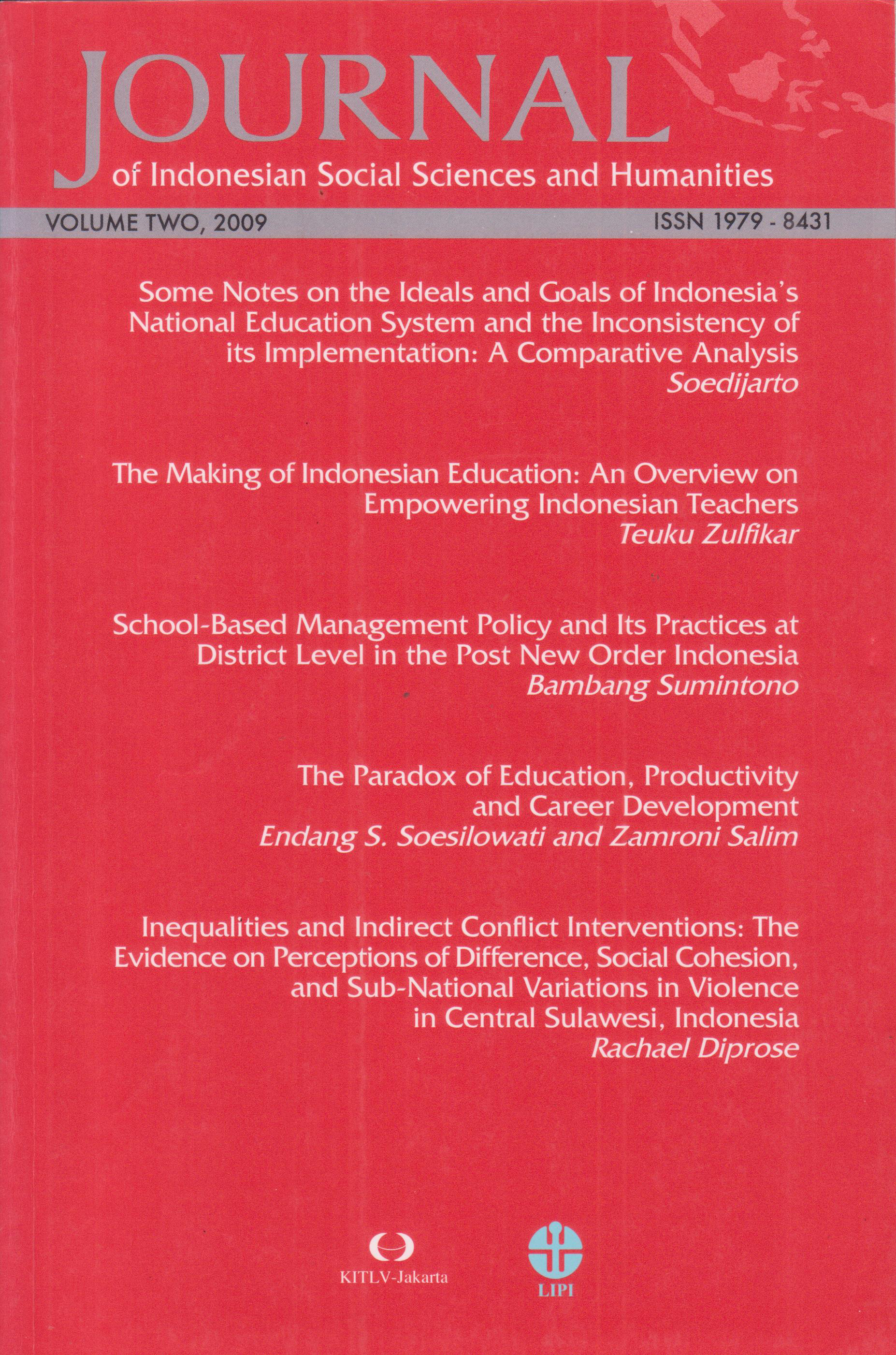Some Notes on the Ideals and Goals of Indonesia’s National Education System and the Inconsistency of its Implementation: A Comparative Analysis
Abstract
The Republic of Indonesia’s State Constitution of 1945 adopted a basic policy that obliges the government to run one national education system. It would seem it was the belief of the Founding Fathers when they drafted the constitution that education would be the strategic vehicle for ensuring that the newly independent Indonesian nation would be modern, democratic, prosperous, and with a concept of social justice based on the state philosophy of Pancasila. In implementing the basic policy, a series of education laws (1950, 1954, 1989 and 2003) have been promulgated that were to produce an educated citizenry who would be ‘intelligent, healthy, moral, democratic, and responsible’. This policy, and the goals and principles of education formulated in the constitution and in subsequent education laws, is in line with a paradigm followed by many nations that have made education an effective means of supporting their growth and development. Education is seen by some economists and political scientists to have a strategic role in improving the quality of life for Indonesian citizens. However, there has been no serious political determination on the part of the elites who control government and parliament to support the implementation of an education system that accords with the hopes and ambition of the Founding Fathers. The funding necessary for education has not been set aside in national budgets despite the constitutional and legislative requirements and expectations that this be done. The funding for education in Indonesia, compared with other developing nations, is low. The goals and principals adopted in the constitution and education laws have not been seriously and consistently implemented.
References
Almond, GA and Verba, S (1965). The Civic Culture: Political Attitudes and Democracy in Five Nations. Boston: Little Brown.
BPS-Statistics Indonesia, Bappenas and UNDP Indonesia (2004). National Human Development Report 2004: the Economics of Democracy: Financing Human Development in Indonesia (2004). Jakarta: BPS-Statistics Indonesia, Bappenas and UNDP Indonesia.
Carnowy, M and Levin, Henry M (eds) (1976). The Limits of Educational Reform. New York: David McKay Co.
Cohen, Yehudi (1970). ‘School and Civilization States’ in Fischer, J (ed.). The Social Sciences and the Comparative Study of Educational Systems. Scranton: International Textbook Co.
Harbison, F and Myers, CA (1965). Manpower and Education: Country Studies in Economic Development. New York: McGraw-Hill.
Kerr, Clark (1963). The Uses of the University. Cambridge: Harvard University Press.
Li Lanqing, (2005). Education for 1.3 Billion: Former Chinese Vice Premier Li Lanqing on 10 Years of Education Reform and development. Hong Kong: Pearson Education Asia.
Lipset, Seymour M (1963). Political Man: the Social Bases of Politics. Garden City: Doubleday.
Malik Fajar, Undang-undang Republik Indonesia No. 20 Tahun 2003 Tentang Sistem Pendidikan Nasional (2006), Jakarta, Departemen Pendidikan Nasional RI.
MPR RI, Undang-undang Dasar Negara Republik Indonesia Tahun 1945 (2008), Jakarta, Sekretariat Jenderal MPR RI.
Soedijarto (2008). Landasan dan Arah Pendidikan Nasional Kita. Jakarta: Buku Kompas.
Unesco (1976). Learning, the Treasure Within: Report to UNESCO of the International Commission on Education for the Twenty-first Century. Paris: Unesco Publishing.
Downloads
Published
Issue
Section
License
Copyright (c) 2009 Soedijarto

This work is licensed under a Creative Commons Attribution-NonCommercial-ShareAlike 4.0 International License.
Authors who publish with this journal agree to the following terms:
1. Authors retain copyright and grant the journal right of first publication with the work simultaneously licensed under an Attribution-ShareAlike 4.0 International (CC BY-SA 4.0) license. This license allows others to remix, adapt, and build upon the work, as long as they credit the author and license their new creations under the same terms.
2. Authors may enter into separate, additional contractual arrangements for the non-exclusive distribution of the journal’s published version of the work (e.g., posting it to an institutional repository or including it in a book), provided there is an acknowledgment of its initial publication in this journal.
3. Authors are permitted and encouraged to post their work online (e.g., in institutional repositories or on their personal website) prior to and during the submission process, as this can lead to productive exchanges and increase citations of the published work (See The Effect of Open Access ).


















